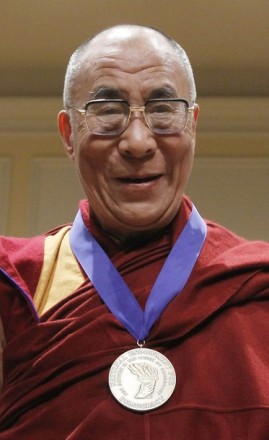His Holiness the Dalai Lama had two main events. In the morning he joined a small group discussion on improving childcare worldwide, particularly care for orphan children. In the afternoon, His Holiness attended a luncheon reception where he received the first Whole Child International Humanitarian Award and participated in a question and session with TV journalist Giselle Fernandez.

His Holiness started the day at 9 am by holding private audiences in his room at the Hotel Montage with members of the Whole Child International, a charity organisation dedicated to improving orphanage care-giving that is hosting His Holiness in Los Angeles.
Then from 9:30-11:30 am, His Holiness participated in a small discussion held in the hotel titled “Compassion in Action: Cultivating the Intimate Care for Vulnerable Children Globally”. There were about fifteen attendees who included Whole Child representatives, child-care experts and academics, philanthropists. They explored how to improve care giving in orphanages around the world while at the same time promoting government and institutional funding for better care-giving for orphan children.
Among the attendees were Nilmini Rubin, Senior Member of the US Senate Foreign Relations Committee; Ruth Levine from the Center for Global Development; Gary Newton, US Government Special Advisor for Orphans and Vulnerable Children; and Robert McCall, Co-Director of the University of Pittsburgh Office of Child Development.
Mrs Karen Gordon, founder of Whole Child International, which is dedicated towards improving the lot of orphans worldwide by shifting the focus in orphan care from speed and efficiency to love and compassion, introduced the organisation. Mrs Gordon isolated three elements that Whole Child seeks to change in the way orphanages function: management, the caregiver’s relationship to the orphan and the physical environment for the child. She added that Whole Child seeks sustainable improvement in childcare by focusing on local capacity building, creation of early childhood specialisation in academia and elevation of childcare through regulation.
Mrs Gordon’s presentation was followed by a discussion on the challenges involved in childcare improvement as well as mentions of research showing the importance of familial care for good childhood development.
His Holiness started off his remarks by pointing out, “Firstly children are also human beings [and therefore should have human rights]. Secondly, our hope for a better future entirely depends on the younger generation.” He went on to emphasise that when there is lack of inner values such as compassion, then people exploit each other; the focus should be on creating a more compassionate society. He said, “We must build the next generation to be a more compassionate generation.” His Holiness stated that if children receive maximum affection when they are growing up, then they will grow to be better human beings.
In the afternoon, His Holiness held some more private audiences. Then at 2 pm he joined a Luncheon Reception held in the Hotel Ballroom on the theme of “Children’s Intimate Relationships in the Early Years – the Root of Compassion”.
At the Luncheon, after Mrs Karen Gordon invited His Holiness onstage to receive the first Whole Child International Humanitarian Award.
The award was presented by Mr George Landegger, board member of WCI and former chair of Georgetown University’s School of Foreign Service.
Then followed a 45 minute Q&A session between His Holiness and Giselle Fernandez, a TV journalist. Giselle Fernandez asked His Holiness what responsibility all of us have to care for motherless children. His Holiness responded that among many mammals, humans’ big brains make us different. Many problems are our own creation, he suggested, because too many emotions have clouded our perspective and we can’t see the big picture. Since a calm, more compassionate mind is essential, His Holiness urged families with children to bring up their children to be more compassionate. He asserted, “If the planet becomes more compassionate, then many problems automatically cease.” He said that to ensure that humanity is healthy, the next generation should be brought up in a healthy way. “Our whole hope remains with them. They are the humanity of the 21st century,” His Holiness said. The luncheon reception was attended by around 280 people.
After the luncheon reception, His Holiness proceeded to do a series of brief interviews with reporters from The Associated Press, Newsweek, Reuters, Los Angeles Times and National Public Radio.
–Report filed by Tenzin Dickyi, Office of Tibet, New York
